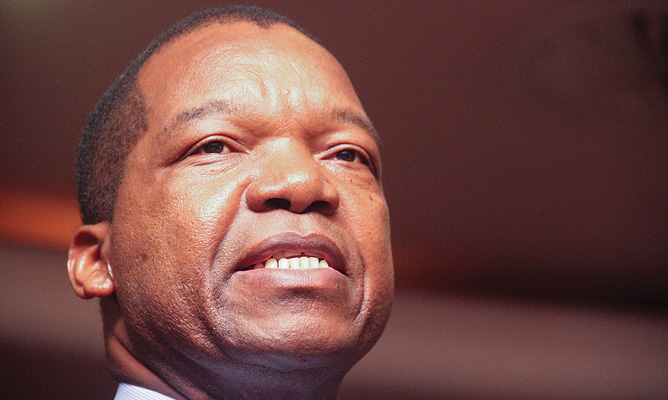
By TATIRA ZWINOIRA
THE Reserve Bank of Zimbabwe (RBZ) has restricted the payment of salaries and wages through bulk payments and mobile money agents as part of measures to curb illicit transactions.
The move by the RBZ, however, is likely to inconvenience thousands of workers who receive their wages through the bulk payment platforms.
Further, the move to curtail mobile money agents may also put thousands of the over 53 000 workers under the country’s largest mobile money network, EcoCash, out of employment.
The new measures were revealed in the mid-term monetary policy statement released yesterday, wherein, RBZ governor John Mangudya said a forensic audit into mobile money transactions had revealed serious illicit activities.
“Mobile payment operators have been turning a blind eye and have even actively encouraged the abuse of bulk payment wallets for illegal foreign currency transactions, thus earning lucrative transaction fees in the process,” Mangudya said.
“Going forward, bulk payment wallets will be approved by regulatory authorities for limited use, primarily for low-value transactions and humanitarian funds disbursements to vulnerable members of society. Any other bulk payment transactions, such as payment of salaries and wages, should be processed through normal banking channels.”
Mangudya told NewsDay Weekender that due to the informality of the economy, small-to-medium enteprises (SMEs) will be allowed, albeit with regulatory approval, to continue paying their workers through bulk payments.
- Chamisa under fire over US$120K donation
- Mavhunga puts DeMbare into Chibuku quarterfinals
- Pension funds bet on Cabora Bassa oilfields
- Councils defy govt fire tender directive
Keep Reading
The governor said large companies will now be required to use normal banking channels.
“We cannot have an organisation like RBZ using a bulk payment line to pay salaries. You see, what was happening was that, if you check some of the transactions through the bulk payment system, they were running into the billions,” Mangudya said.
He said this money was outside the banking sector and as such, made it difficult for them to plan.
The RBZ measures will also affect EcoCash Payroll where subscribers receive salaries through bulk payer transactions.
EcoCash has been the preferred choice to pay unbanked workers. It has 11 million subscribers on its database nationwide.
Zimbabwe Congress of Trade Unions secretary-general Japhet Moyo said: “Let me state, our economy is a bit informalised, therefore, a lot of businesses use these platforms as modes of transactions including the payment of salaries.”
“The way we have done our business over a period of time, we have just informalised everything, so it was a bit easier to make the payments in that platform. We need to know now how these businesses are going to be affected, especially the recipients, that is, the majority of the workers who have been getting their salaries through these mobile platforms.”
On mobile money agents, Mangudya said agent wallets were no longer serving any legitimate purpose, but were being used for illegal foreign exchange transactions. “Agents’ mobile money wallets are therefore abolished with immediate effect,” Mangudya said.
“Agents currently holding value in suspended and frozen wallets shall be allowed to liquidate the funds to their bank accounts, upon the Financial Intelligence Unit having satisfied itself of the legitimacy of the source of funds.”
Mangudya said agents handling small transactions would continue, but under strict regulation, to service unbanked people.
“At the end of the day, the agents will need to have proper ‘know-your-customer’,” he said.
Experts say this will curtail mobile operators’ business transactions.
“That is a massive loss. Definitely it’s going to affect the businesses, because they were the face on the ground, the conduits, on how the mobile networks were actually getting their money especially when you look at the amount of agents that we have,” Zimbabwe Information Communication Technologies chairman Jacob Mutisi said.
“A lot of people are going to be out of their jobs.”
According to the RBZ, the forensic audit to assess the integrity, compliance and efficacy of mobile money platforms and transactions in Zimbabwe reportedly unearthed glaring weaknesses in the systems of the mobile payment operators, namely EcoCash, OneMoney, Telecash and Mycash.
Other changes made to the mobile money industry include limiting daily individual transactions to $5 000.
“Individuals shall be allowed to undertake person to person transfers, person to merchant payments for goods and services, settlement of bills and purchase of airtime,” Mangudya said.
In terms of merchants, the RBZ says merchants will not be allowed to make payments from their wallets and that money in merchant wallets shall be liquidated to the merchant’s bank account.
“Mobile money operators shall have systems in place to ensure automatic liquidations from the merchant wallets to the merchant bank accounts,” Mangudya said.
“This measure shall ensure that mobile payment platforms are not used for store of value, but shall be restricted for transacting purposes in furtherance of financial inclusion in the economy.”
The governor also announced that connectivity by all payment service providers is expected to be completed by September 30.











